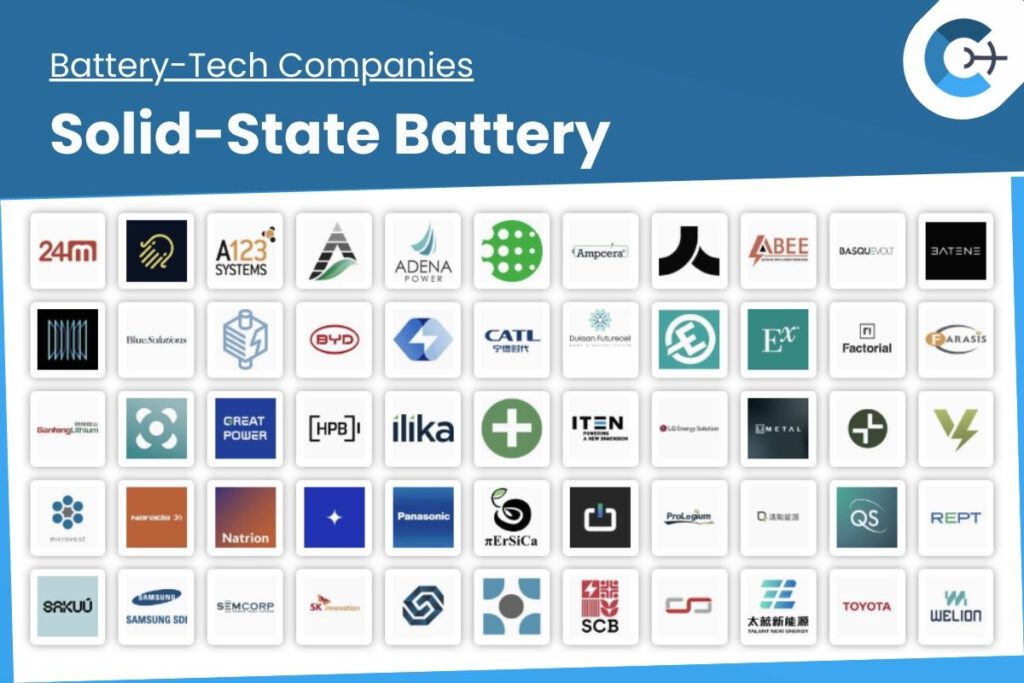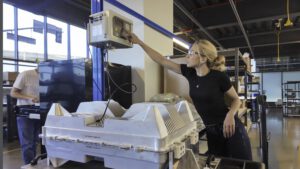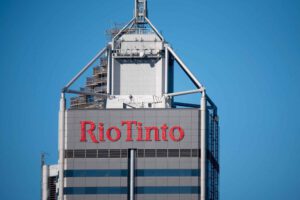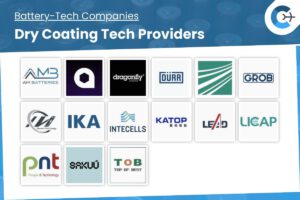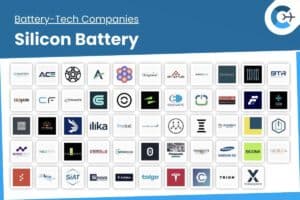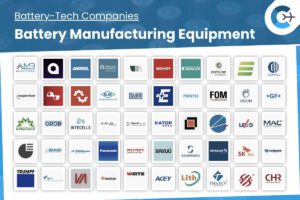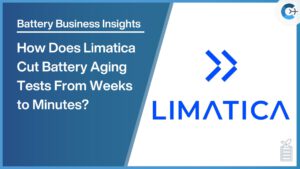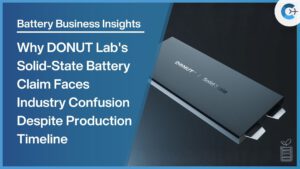Key Players in Solid-state battery Development & Manufacturing

HPB | High Performance Battery
HPB is a German company specialising in advanced solid-state battery technology. Founded in 2018 and led by Dr Sebastian Heinz as CEO, the company develops and licenses its proprietary battery technology to potential partners worldwide, enabling them to bring safe, long-lasting, and sustainable battery solutions to market.

24M Technologies
24M Technologies, founded in 2010 in Cambridge, MA, pioneers advanced battery solutions with its SemiSolid™ and ETOP technologies. Serving electric vehicles, energy storage systems, and aerospace, 24M delivers safer, cost-effective, and sustainable energy. Recent expansions include a Thailand facility and partnerships with Kyocera.

8inks
8inks AG, a Swiss ETH Zurich spin-off based in Schlieren, innovates battery manufacturing with its multi-layer electrode coating technology. Focusing on lithium-ion and solid-state batteries, they enhance efficiency and sustainability for electric vehicles, grid storage, and consumer electronics.
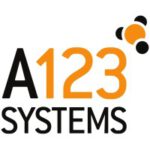
A123 Systems
A123 Systems is a pioneering provider of advanced lithium-ion battery technology established in 2001. The company specializes in developing, manufacturing, and integrating battery cells that deliver energy solutions for automotive, energy storage, and specialized industrial applications. With over 1,200 patents and a large R&D team, the company continues to push the boundaries of battery innovation, including the development of its upcoming Semi-and All-Solid-State Battery.

Adden Energy
Adden Energy, a Waltham-based technology company founded by Harvard scientists, specializes in advanced solid-state battery solutions for electric vehicles. Their solid-state design uses lithium-metal anodes and high-nickel NMC cathodes to deliver higher energy density, faster charging, and improved safety. The company is scaling production via a roll-to-roll pilot facility, aiming to enhance the accessibility and sustainability of EV battery technology.

Adena Power
Adena Power, a Nexceris subsidiary in Ohio, develops innovative sodium solid-state batteries that offer safer, cost-effective, and sustainable energy storage. Utilizing domestic materials and advanced ceramic expertise, they support the transition to renewable energy solutions.

Albufera Energy Storage
Albufera Energy Storage, founded in 2013 in Madrid, specializes in aluminum-based battery solutions. Its three patents and diverse research projects underline the company’s commitment to providing sustainable, efficient, and safer energy storage technologies. These range from aluminum-ion and aluminum-air to aluminum-solid state batteries, each tailored to meet varying industry demands while minimizing environmental impact.
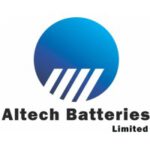
Altech Batteries
Altech Batteries Ltd, an Australian firm, pioneers innovative battery solutions for grid storage and lithium-ion markets. Its CERENERGY® and Silumina Anodes™ technologies offer enhanced safety, durability, and efficiency.

Alteva Technologies
Alteva Technologies GmbH, based in Cologne, develops ultra-lightweight lithium-sulfur batteries derived from DLR research. Their batteries are three times lighter than traditional lithium-ion, advancing electrification in aviation, long-haul trucking, and heavy machinery with high performance and sustainable design.
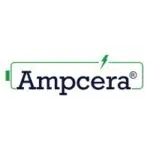
Ampcera Inc.
Ampcera Inc., founded in 2017 and based in Milpitas, CA, specializes in solid-state battery materials and integrated systems. Utilizing advanced sulfide-based electrolytes, they produce high-energy, safe batteries with up to 400 Wh/kg and rapid charging. Serving over 200 global clients, Ampcera is expanding production to meet growing demand by 2026.

Anhui Axxiva New Energy Technology Co., Ltd.
Anhui Axxiva New Energy Technology Co., Ltd, founded in 2020, is a Chinese pioneer in advanced battery solutions. Leveraging solid-state, semi-solid, and NMC technologies, it propels innovations in EVs, power, and energy storage.

Anthro Energy
Anthro Energy, based in Alameda, CA, transforms lithium-ion battery performance with its Anthro Proteus™ phase-change electrolyte. This solution boosts safety, energy density, and manufacturing efficiency for EVs, electronics, and aerospace.

AVESTA Holding (former ABEE)
AVESTA Holding, based in Ninove, Belgium, specializes in advanced lithium-ion and solid-state batteries for automotive and stationary applications. Founded in 2019, AVESTA leverages AI and advanced modeling to optimize performance and sustainability across the battery value chain, positioning itself as a key player in the European battery ecosystem through innovative projects and large-scale production.
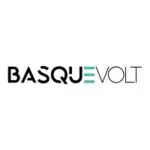
BASQUEVOLT
Basquevolt, based in Vitoria-Gasteiz, Spain, develops advanced solid-state lithium batteries for electric vehicles, energy storage, and portable devices. Backed by major investors like the Basque Government and Iberdrola, Basquevolt offers safer, higher-density, and sustainable battery solutions.
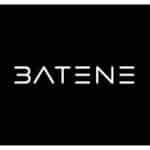
Batene
Batene GmbH is a German energy tech startup revolutionizing battery design with its patented batene fleece™. This innovation enhances lithium-ion and next-gen batteries with faster charging, improved safety, and cost efficiency.

Blue Current Inc.
Blue Current Inc., based in Hayward, California, develops advanced all-solid-state batteries using silicon elastic composite technology. Their safer, high-energy solutions target electric vehicles, wearables, and mobility applications, aiming to enhance efficiency, reduce costs, and ensure reliable energy storage.

Blue Solutions
Blue Solutions, a subsidiary of the Bolloré Group since 1997, specializes in solid-state lithium metal polymer batteries. With over 600 million kilometers powered and advanced GEN4 technology, they provide safe, high-density, and sustainable energy solutions for transportation, aviation, and consumer goods through strategic partnerships and ongoing innovation.

BTRY
BTRY is a Swiss cleantech startup developing solid-state lithium-ion batteries that charge in one minute. Using advanced semiconductor manufacturing and sustainable practices, they provide energy-dense, safe, and efficient storage solutions. Initially targeting IoT, BTRY plans to expand into consumer electronics, robotics, aerospace, and medical sectors.

BYD
BYD Company Ltd., founded in 1995 in Shenzhen, China, is a global leader in electric vehicles and sustainable energy solutions. With nearly 900,000 employees worldwide, BYD specializes in EVs, advanced battery technologies like Blade and Cell-to-Pack, and rail transit systems, leveraging vertical integration for quality and efficiency.
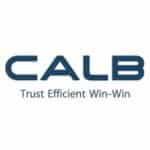
CALB Group Co. Ltd.
Founded in 2007 and based in Changzhou, CALB Group Co., Ltd. is a leading Chinese manufacturer of advanced lithium-ion batteries for electric vehicles and energy storage systems. Renowned for innovations like U-structure and solid-state technologies, CALB serves global automotive and industrial clients through a strong focus on R&D and manufacturing excellence.

Cerebral Energy
Cerebral Energy LLC, a service-disabled veteran-owned business in Wyoming, specializes in advanced solid-state battery technologies using recycled materials. Their AGILE lithium-free batteries enhance energy efficiency and safety for aerospace and military applications, promoting sustainable energy solutions and domestic independence.
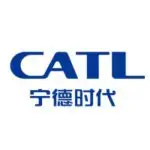
Contemporary Amperex Technology Co. Limited (CATL)
CATL, a global leader in battery technology since 2011, is based in Ningde, China and stands as the world’s largest EV battery producer. It’s celebrated for its innovative LFP batteries and pioneering cell-to-pack process, driving sustainable energy storage and electric vehicle advancements.

Donut Lab
Donut Lab (Espoo, Finland) develops an integrated EV platform combining a company‑reported 400 Wh/kg all‑solid‑state battery with ~5‑minute charging, high‑torque in‑wheel motors, embedded control electronics and DonutOS digital‑twin software for vehicles and industrial systems.

Duksan Futurecell Co., Ltd
Duksan Futurecell Co., Ltd is a South Korean leader in advanced solid-state battery technology. Specializing in ceramic separators and high-performance cells, they develop safer, more efficient energy storage solutions for electric vehicles and large-scale applications.

Enpower Greentech Inc.
Established in 2012 and based in San Jose, Enpower Greentech Inc. leads in advanced solid and semi-solid-state battery technology. With global facilities in the USA, Japan, and China, they provide high-density energy storage solutions for electric vehicles, drones, and renewable energy systems.
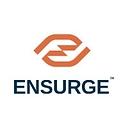
Ensurge
Ensurge Micropower ASA, based in California, pioneers advanced solid-state lithium microbatteries for hearables, wearables, and IoT devices. Their proprietary 11-layer design ensures rapid charging, extended cycle life, and enhanced safety for next-gen electronics.

EVE Energy
EVE Energy Co., Ltd., founded in 2001 in Huizhou, China, is a leading lithium-ion battery manufacturer. Specializing in batteries for electric vehicles, energy storage, and consumer electronics, it partners with brands like BMW and Tesla. With global production facilities and a focus on innovation and sustainability, EVE Energy advances battery technology to support the clean energy transition.

Factorial Energy
Factorial Energy, based in Massachusetts, develops advanced solid-state batteries for electric vehicles and energy storage. Utilizing proprietary FEST® and Solstice™ platforms, they enhance safety, energy density, and performance. Through strategic partnerships with major automakers, they drive advancements in battery technology.

Farasis Energy
Farasis Energy, established in 2002 in Silicon Valley, develops and manufactures advanced lithium-ion and solid-state batteries. Specializing in high-energy pouch cells for electric vehicles and sustainable power storage, they serve automotive, industrial, and energy sectors with innovative, high-performance solutions.
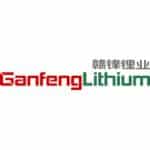
GanfengLithium
Ganfeng Lithium, established in 2000 in Xinyu, Jiangxi, is one of the world’s leading lithium salt producers, known for its fully integrated operations encompassing resource development, refining, battery manufacturing, and recycling. The company serves major global clients such as Tesla, BMW, and LG Chem, and focuses on advancing multiple battery technologies—including solid-state, semi-solid-state, and lithium iron phosphate—catering to electric vehicles, energy storage, and consumer electronics.

Gelion
Gelion plc, headquartered in London and listed on AIM, pioneers lithium-sulfur and zinc-bromide energy storage solutions. Originating from the University of Sydney, the company delivers sustainable technologies for renewable energy, aerospace, and automotive applications, supported by strategic partnerships and robust investments.

Great Power
Established in 2001 and listed on the Shenzhen Stock Exchange, Guangzhou Great Power Energy & Technology is a global leader in battery manufacturing. Specializing in lithium-ion, solid-state, and sodium-ion technologies, it serves energy storage, new energy vehicles, and electronics markets in over 50 countries. Recognized by BloombergNEF as a Tier 1 manufacturer, Great Power emphasizes innovation and safety.

Hytzer New Energy (Changzhou) Co., Ltd
Hytzer New Energy (Changzhou) Co., Ltd is a technology leader in all‐solid‐state lithium batteries. Its advanced polymer electrolytes and patented ‘Hardness with Softness’ system deliver superior safety, energy density, and versatile performance.

Ilika
Ilika plc, founded in 2004 in the UK, leads in solid-state battery technology with operations in the UK, USA, and Japan. It develops safer, more efficient batteries for electric vehicles, medical devices, and IoT applications, advancing energy storage in transportation and healthcare sectors.

Ion Storage Systems
Ion Storage Systems, headquartered in Beltsville, Maryland, leads in solid-state lithium metal batteries, enhancing safety, efficiency, and sustainability. Founded by experts Eric Wachsman and Greg Hitz, the company’s innovative technology serves electric vehicles, aerospace, defense, and grid storage, positioning them as pioneers in next-generation energy solutions.
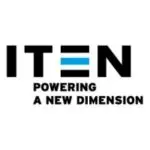
ITEN
ITEN, based in Dardilly, France, leads the energy storage sector with its solid-state lithium-ion micro-batteries. Offering safer, more efficient, and eco-friendly solutions, ITEN’s high-performance batteries power applications in IoT, wearables, healthcare, and smart cities.
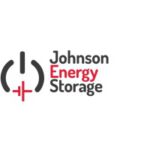
Johnson Energy Storage, Inc.
Johnson Energy Storage, Inc. develops advanced all-solid-state lithium battery solutions using a patented glass electrolyte separator for higher energy density and safety. Based in Atlanta, the company drives innovation for diverse applications.
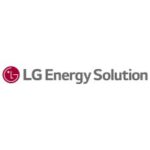
LG Energy Solution
Founded in 2020 as an LG Chem spin-off, LG Energy Solution is a global leader in lithium-ion battery manufacturing for electric vehicles, energy storage, and portable devices. Leveraging over 30 years of expertise and advanced technologies, the company delivers high-performance, sustainable energy solutions through strategic partnerships worldwide.
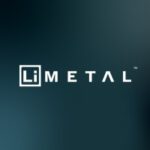
Li-Metal
Li-Metal Corp, founded in 2019 in Canada, specializes in sustainable lithium metal anodes and production technologies. They develop advanced battery materials for higher energy density in electric vehicles and energy storage, using innovative, eco-friendly processes to enhance performance and reduce costs.

Li-S Energy
Li-S Energy Limited, based in Brisbane, Australia, leads in developing advanced lithium-sulfur and lithium metal battery technologies. Their innovative Li-nanomesh™ and BNNT solutions enable lighter, safer, and higher-energy storage for diverse applications.

LiNa Energy
LiNa Energy, founded in 2017 and based in Lancashire, UK, develops advanced solid-state sodium batteries. By eliminating lithium and cobalt, their sustainable, cost-effective solutions enhance grid stability, industrial energy storage, and electric vehicle applications, positioning them as key players in renewable energy storage.

LionVolt
LionVolt B.V., founded in 2020 and based in Eindhoven, Netherlands, specializes in next-generation solid-state batteries using innovative 3D architecture. Their high-energy, fast-charging, and safe solutions cater to applications in consumer electronics and electric vehicles, driving sustainable energy storage advancements.
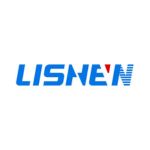
LISHEN
LISHEN, headquartered in Tianjin, China, is a state-backed leader in lithium-ion battery innovation. The company advances sodium-ion and semi-solid cell technologies, powering EVs, consumer electronics, and grid-scale energy storage.

Lyten
Lyten, based in San Jose, specializes in lithium-sulfur batteries using proprietary 3D Graphene technology. Offering double the energy density of lithium-ion and reduced environmental impact, their sustainable solutions serve automotive, aerospace, and energy sectors. Lyten is expanding production with a Nevada gigafactory and has strong investor backing.
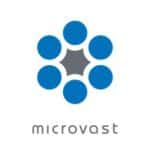
Microvast
Microvast Holdings, Inc., based in Stafford, Texas, is a global leader in lithium-ion battery technology since 2006. Specializing in high-performance solutions like All-Solid-State Batteries, Microvast serves transportation and utility-scale energy storage markets across 34 countries. Their vertically integrated approach ensures rapid-charging and long-lasting energy systems.

Narada
Narada is a major global battery manufacturer founded in Hangzhou, China, offering lead-acid, lithium-ion, and emerging solid-state battery solutions to serve sectors such as telecommunications, electric power, renewable energy, and electric mobility. The company operates in over 150 countries and has strong research and development capabilities, including a recent focus on advanced solid-state battery applications.

Natrion Inc.
Natrion Inc., founded in 2018 in Binghamton, NY, specializes in solid-state and lithium-metal battery technologies. Its patented LISIC technology improves battery performance, safety, and scalability for electric vehicles, renewable energy, and other high-performance applications.

Nuvvon Inc.
Nuvvon Inc., headquartered in Bordentown, NJ, develops next-generation solid-state lithium metal batteries with proprietary solid polymer electrolytes. Their high-energy, safe, and scalable solutions target electric vehicles, aerospace, and industrial applications, advancing efficient and sustainable energy storage.

Panasonic
Panasonic Holdings Corporation, founded in 1918 in Osaka, is a global electronics leader specializing in consumer electronics, automotive systems, and industrial solutions. Committed to sustainability, Panasonic advances EV battery technology, clean energy, and innovative energy management systems.

Piersica
Piersica, founded in 2020 by Dr. Claudiu Bucur, develops next-generation solid-state lithium batteries offering higher energy density, enhanced safety, and faster charging. Their innovative technology serves electric vehicles, consumer electronics, aerospace, medical devices, and renewable energy sectors.

PolyPlus Battery Company
PolyPlus Battery Company, based in Berkeley since 1991, specializes in high-energy-density lithium-based batteries. Utilizing proprietary technologies like Glass Protected Li Metal Batteries and PLE™, they provide efficient solutions for automotive, medical, drones, and underwater applications. Backed by significant investments, PolyPlus drives next-generation energy storage.

PowerCo
PowerCo, a Volkswagen Group subsidiary founded in 2022 in Salzgitter, Germany, specializes in sustainable battery cell manufacturing for electric and commercial vehicles. Leveraging the Unified Cell concept and advanced solid-state technology, PowerCo targets 200 GWh annual production while upholding strict environmental standards.
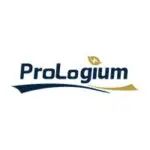
ProLogium Technology
ProLogium Technology, founded in 2006 in Taoyuan, Taiwan, leads in solid-state lithium ceramic batteries. As the only mass producer, its high-energy, fast-charging solutions power EVs, consumer electronics, and industrial applications. With over 900 patents and global partnerships, ProLogium drives sustainable energy innovation.

Qingtao
Qingtao (Kunshan) Energy Development Group Co., Ltd. pioneers solid-state lithium-ion battery technology, advancing energy storage solutions for EVs and stationary systems through integrated R&D, manufacturing, and key industrial partnerships.

QuantumScape
QuantumScape, based in San Jose and founded in 2010, develops solid-state lithium-metal batteries for electric vehicles. Their innovative anode-less design delivers higher energy density, faster charging, and enhanced safety. Partnered with Volkswagen, they aim to advance EV energy storage technology.

REPT BATTERO
Founded in 2017, REPT BATTERO Energy Co., Ltd. is a leading Chinese manufacturer of lithium-ion batteries and energy storage solutions. As part of Tsingshan Industrial, the company boasts a 62 GWh production capacity and specializes in advanced Wending series and solid-state batteries for electric vehicles and smart energy systems, establishing a strong global presence.

Sakuu
Sakuu Corporation, founded in 2016 in San Jose, California, specializes in 3D-printed lithium metal batteries aimed at reducing waste and dependency on traditional energy sources. The company’s Kavian platform leverages a dry, multi-material approach to enable custom-shaped batteries that feature enhanced thermal management and improved performance metrics.

Samsung SDI
Samsung SDI, founded in 1970, is a global leader in advanced battery technologies and electronic materials. Specializing in lithium-ion and solid-state batteries, it serves electric vehicles, consumer electronics, and energy storage systems, driving innovation and sustainable energy solutions worldwide.
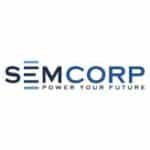
SEMCORP Advanced Materials Group
SEMCORP Advanced Materials Group is a global leader in lithium-ion battery separator production. Headquartered in China, it uses advanced ceramic, PVDF, and aramid coatings to improve battery safety and efficiency in EVs, storage, and electronics.
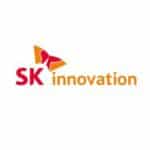
SK Innovation
SK Innovation, a leading South Korean energy solutions provider, specializes in sustainable energy and advanced battery technologies. Through subsidiaries like SK On, it excels in EV battery manufacturing, solid-state and cobalt-free batteries, and invests in renewable energy, maintaining a strong global presence.

Soelect
Soelect Inc., based in Greensboro, NC, pioneers lithium-ion battery technology with LiX® anode and solid-state electrolytes. Their scalable production delivers fast charging, high energy density for EVs, electronics, and aerospace.

Solid Power Inc.
Solid Power Inc., headquartered in Louisville, Colorado, pioneers all-solid-state battery technology with proprietary sulfide-based electrolytes. Offering higher energy density and extended life cycles, their batteries are tailored for automotive applications. Backed by major investors like Ford and BMW, Solid Power is advancing production and innovating energy storage solutions for electric vehicles.

Solidion Technology Inc.
Solidion Technology Inc., based in Dallas, specializes in advanced battery technologies for electric vehicles and renewable energy. Holding over 500 patents, the company leads in silicon anodes, nanostructured graphene-sulfur cathode, sustainable graphite production, and graphene-enhanced fast-charging solutions.

Svolt
SVOLT Energy Technology Co., Ltd. leads in advanced battery design, manufacturing innovative cells, modules, and storage systems. Its Short Blade and next-gen battery chemistries accelerate EV charging and sustainable energy applications globally.

Swiss Clean Battery AG
Swiss Clean Battery AG, headquartered in Frauenfeld, Switzerland, pioneers solid-state battery technology as a safer, eco-friendly alternative to lithium-ion. Offering 50% better environmental performance and extended durability, SCB supports renewable energy transitions with advanced energy storage solutions and one of Europe’s first mass production facilities.

TaiSan
TaiSan, a Cambridge-based UK startup founded by Forbes 30 Under 30 Sanzhar Taizhan, develops next-generation quasi-solid-state sodium batteries for automotive applications. Their sustainable, cost-effective technology delivers high energy density and integrates seamlessly with existing manufacturing, aiming to transform electric vehicle energy storage.
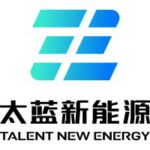
Talent New Energy
Talent New Energy, a leading Chinese innovator in solid‐state battery technology, develops advanced energy storage for electric vehicles and renewables. Its separator‐free designs boost safety, energy density and efficiency.

theion
Founded in 2020 in Berlin, Theion GmbH develops lithium-sulfur batteries with sulfur crystal technology. Their batteries offer triple the energy density of lithium-ion alternatives at lower costs, supporting electric mobility, aviation, and renewable energy storage with improved performance and sustainability.

Toyota
Toyota Motor Corporation, founded in 1937, is a global automotive leader driving innovation in hybrid, EV, and advanced battery technologies. The company aims to reshape mobility with a strong focus on safety and sustainability.

Toyota Battery Co., Ltd
Toyota Battery Co., Ltd., a subsidiary of Toyota Motor Corporation, drives advanced battery research and manufacturing for HEVs, PHEVs, BEVs, and FCVs. Covering material science to system integration, it supports sustainable electrification.
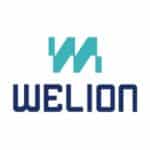
Welion Energy
Welion Energy, founded in 2016 and headquartered in Beijing, China, is a leading innovator in advanced battery technology that combines safety with high energy density and rapid charging. Its battery solutions power EVs, marine and portable applications.
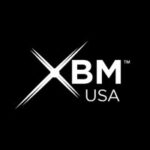
Xponential Battery Materials
Xponential Battery Materials (XBM), established in 2020 in Los Angeles, develops sustainable cathode materials using industrial byproducts. Their innovative approach supports next-generation Li-S and solid-state batteries for domestic applications.
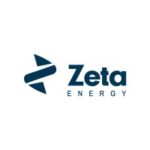
Zeta Energy Corp.
Zeta Energy Corp., headquartered in Houston since 2014, develops advanced lithium-sulfur batteries that offer triple the energy density of lithium-ion at half the cost. By eliminating critical materials, Zeta provides sustainable energy storage solutions for electric vehicles and renewable systems. Partnered with Stellantis and backed by over $27 M in funding, the company leads in innovative, eco-friendly battery technology.
Solid-State Battery Technology
Solid-State Batteries (SSBs) represent a notable technological advancement in lithium-ion battery technology, distinguished by the replacement of traditional liquid or gel electrolytes with solid materials. This structural modification is intended to enhance multiple aspects of battery performance.
Key Characteristics of Solid-State Batteries
Solid-State Batteries are characterized by alternative electrolyte (solid-state electrolyte) materials, which can lead to increased energy density, improved safety due to reduced risk of leakage or fire, and the potential for faster charging. Additionally, SSBs can operate at higher voltages and are compatible with lithium metal anodes, further influencing their overall performance.
Classification of Solid-State Batteries by Electrolyte Material
Solid-State Batteries are primarily categorized into three types based on the solid electrolyte material employed:
Oxide Electrolyte Solid-State Batteries (LiOx-concept)
These batteries utilize materials such as Lithium Lanthanum Zirconium Oxide (LLZO), offering good structural stability and safety. While they exhibit lower ionic conductivity compared to some other materials, their high chemical stability and compatibility with lithium metal anodes are notable advantages.
Sulfide Electrolyte Solid-State Batteries
This category encompasses two variations.
- Sulfide Electrolyte with Lithium Anode (LiSu-concept), characterized by high ionic conductivity, suitability for high-power applications, and sensitivity to moisture.
- Sulfide Electrolyte with Silicon Anode (SiSu-concept), which leverages silicon anodes to potentially achieve higher energy densities in conjunction with sulfide electrolytes.
Polymer Electrolyte Solid-State Batteries (LiPo-concept)
Employing materials like Polyethylene Oxide (PEO), these batteries offer design flexibility and are suited for applications requiring lightweight or adaptable formats. However, they typically necessitate higher operating temperatures to ensure sufficient ionic conductivity.
SSB Development Challenges
Current major obstacles to the development of solid-state battery technology include cost, scalability, and the requirement to ensure long-term stability and performance across various environments. Ongoing research and development efforts are focused on addressing these hurdles, with the ultimate goal of fully realizing the potential of SSBs in the application of energy storage solutions. As the field continues to evolve, Solid-State Batteries are likely to play a significant role in shaping the future of this critical technology sector.
Solid-State Battery (SSB) Development
SSBs categorized by their technological focus and market positioning:
| Company | Technology Focus | Key Innovations | Strategic Partners | Projected Commercialization |
|---|---|---|---|---|
| Toyota | Sulfide-based electrolytes | 750-mile EV range; 10-minute charging; 1,000+ patents | Panasonic | Hybrid EVs by 2025; Full EVs 2027 |
| QuantumScape | Ceramic separators | Anode-less design; Dendrite suppression at 4C charging | Volkswagen | QSE-5 cells in 2026 |
| CATL | Hybrid condensed-state batteries | 500 Wh/kg energy density; Gel-solid electrolyte hybrid | Chinese government initiatives | Small-scale production by 2027 |
| Solid Power | Sulfide electrolytes | Silicon-carbon anodes; 930 Wh/L density | BMW, Ford | 2028 model-year vehicles |
| ProLogium | Oxide ceramic electrolytes | Roll-to-roll manufacturing; 40% cost reduction | Mercedes-Benz | Marseille gigafactory by 2026 |
| WELION | Oxide-based SSBs | Semi-solid transition tech; 577-mile NIO pack integration | NIO, Chinese Academy of Sciences | Deployed in swap stations (2024) |
| LG Energy Solution | LLZO solid electrolytes | Room-temperature operation; 500-cycle durability | UC San Diego | Pilot production by 2026 |
| Factorial Energy | Polymer-based electrolytes | FEST® tech; 600+ mile range; 40% weight reduction | Hyundai, Stellantis | Prototype validation by 2025 |
| Adden Energy | Multilayer architecture | 3D lithium anode; 10-minute charging | Harvard University spinout | EV prototypes by 2026 |
| Samsung SDI | Sulfide electrolytes | Anode-less design; 900 Wh/L density | Automotive OEMs (undisclosed) | Robotics focus from 2027 |
| BYD | Dual-path sulfide/oxide systems | 60% interfacial resistance reduction; <$100/kWh target | Chinese government subsidies | Luxury EVs by 2027 |
| Ilika | Sulfur-based thin-film SSBs | <1mm thickness; 140 Wh/kg for medical IoT | Jaguar Land Rover | Stereax® production in 2025 |
Technology comparison across key players in Solid-State Battery technology
| Electrolyte Type | Advantages | Challenges | Leading Companies |
|---|---|---|---|
| Sulfide | High ionic conductivity (~10 mS/cm) | Sensitivity to moisture; H2S risks | Toyota, Samsung SDI, Solid Power |
| Oxide | Thermal stability >800°C | Brittle interfaces; high resistance | WELION, ProLogium, BYD |
| Polymer | Flexibility; low-cost processing | Low conductivity at room temp | Factorial Energy, Ilika |
| Hybrid (Solid-Gel) | Compatibility with existing lines | Energy density trade-offs | CATL |

